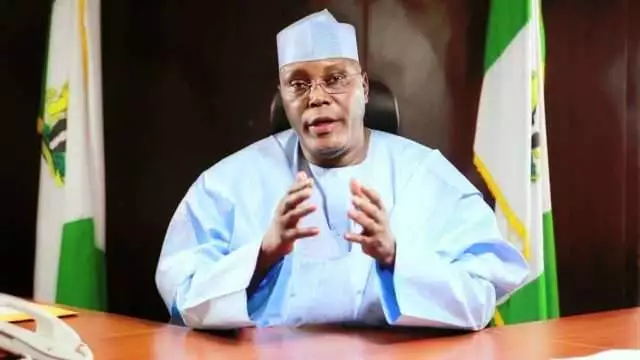By Onyekachi Ekeh
Barring any last minute change of plans, former Vice President of Nigeria and candidate of the Peoples Democratic Party (PDP), in 2019 presidential election, Alhaji Atiku Abubakar, will on Wednesday, March 23, officially declare his intention to contest the 2023 presidential election.
Although the former Vice President and some of his key support groups have been criss-crossing the nation in a bid to consult critical interests, socio-political blocks, opinion leaders and influencers within and outside the PDP, he is yet to make his 2023 ambition public officially.
Indications are that Atiku remains a formidable consensus choice of an overwhelming number of party faithful across board, especially from the South, irrespective of a pocket of opposition to his possible candidacy, within the party.
This critical support base insists that the former Vice President possesses the attributes of a unifier. They also said he is a remarkable wealth creator and broad-minded leader that is at home with the ever changing socio-economic dynamics, which they reasoned, would be an asset, should he become a president.
It is either a coincidence or strategic that the coming declaration coincides with the timeline set by the PDP for the commencement of sales of 2023 elections nomination and expression of interest forms.
While not many would be surprised by Atiku’s decision to join the 2023 political fray, his declaration elicit a lot of interest and conversations around zoning and the delicate South/North political dichotomy ahead of the general election.
The ruling All Progressives Congress (APC), had earlier zoned its presidential position to the South and chairmanship of the party to the North.
The opposition PDP has remained seemingly in a dilemma as regards zoning. Some of its faithful from the northern part of the country, in demanding that the North produces the next president argued that, “it’s a fact that the Southern part of the nation had held sway for over 14 of the 16 years that the PDP had been in office since 1999, through former Presidents Olusegun Obasanjo 8 years (1999-2007) and Goodluck Jonathan, 6 years (2010-2015), while the North had only ruled for a little over two years under the late former President Umaru Yar’Adua,” who unfortunately died in office.
Also in recent months, there have been impassioned agitations within the PDP, in the South for the party to decisively zone the position of the president to the South, essentially the South East, as PDP had already produced a national chairman from the North Central.
But from all indications, the party appears to favour leaving the position open to all PDP members irrespective of geopolitical zones.
This approach, according to those in the know in the PDP leadership, is not only expedient, giving the current political dynamics of challenging a ruling party in an election taunted to be very consequential, but will also provide a level playing ground for all PDP faithful, which the sources said is hinged on true principles of democracy.
For Atiku, there have also been noticeable sentiments against his presidential ambition, by mostly from opposition within PDP from both southern and northern interests, in the past months, on account of his age and the fact that he had represented the party in the past without success.
The argument of these set of people is that he should give chance to others in the party to also take a shot at the top job.
But Atiku’s camp has always posited that none of his critics had curiously ever questioned his capacity to lead a 21st century Nigeria out of its current multi-faceted challenges, neither have they doubted his reach, human/material resource management skills, nor his ability to unify the nation.
Atiku’s main interest in the 2023 presidential race, according to a Senator from the South, who is an insider in his camp, “Is to join hands with other well-meaning Nigerians, who have watched in bewilderment, how the current government have turned the nation into a gravely disunited and horribly unsafe entity, which is a negation of our dream nation of a happy, united and prosperous people.”
His message, as he goes about his consultation, according to the source, is simple: According to him, “It is disheartening for me to see the horrendous depth of disunity and mutual distrust, along ethnic and religious lines, our nation has been sadly thrown into, through insensitive leadership of the past seven years of Buhari administration. Under its watch, the current insecurity in the North has degenerated into a disturbing monster that is dangerously intertwined with religion, which makes it increasingly more complicated. If I may be honest with you, leaving such complex security challenges in the hands of any of my brothers from the South to solve, would amount to inviting such a person into a field littered with landmines, on account of the delicate, complex religion intersection, I referenced earlier.”
Restructuring of the country, which would be one of the focal points of an Atiku presidency, according to the ranking lawmaker, would most likely witness similar ethnic/religious misgivings, should a southerner tries to carry out such an agenda at this point of time that the nation is so polarized. So, what Atiku is asking for, in earnest, the source continued, is “not to wilfully take the turn of any of his brothers, among the PDP faithful from the South or North, but for an opportunity to take on those challenges headlong, on behalf of the good people of Nigeria; and save the nation from further descent into the abyss of disunity, economic collapse and insecurity.”
Meanwhile, expectations are high, as Atiku is set to go on the march again.
• Dr Onyekachi Eke, is a financial consultant and writes from Enugu







